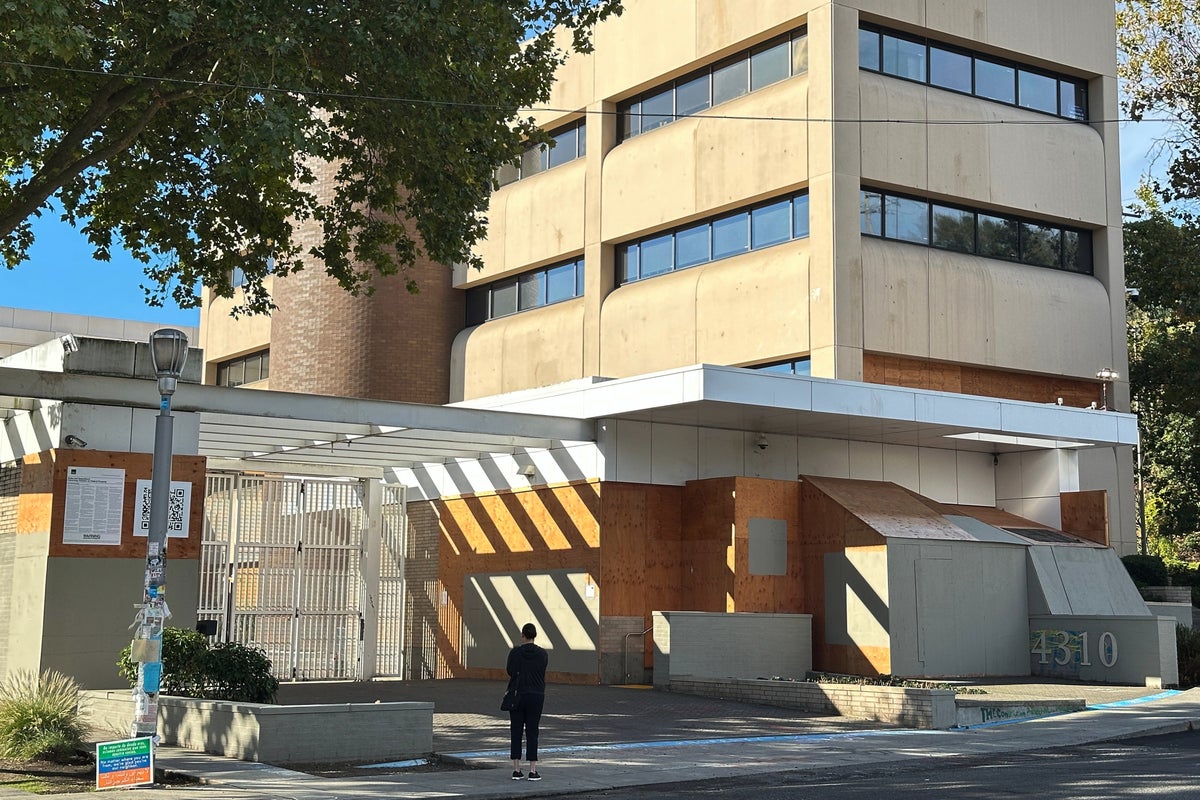
President Donald Trump said Saturday that he will send troops to Portland, “authorizing Full Force, if necessary” to handle “domestic terrorists” as he expands his deployments to more American cities.
He made the announcement on social media, writing that he was directing the Department of Defense to “provide all necessary Troops to protect War ravaged Portland.” Trump said the decision was necessary to protect U.S. Immigration and Customs Enforcement facilities, which he alleged is “under siege from attack by Antifa, and other domestic terrorists.”
The White House did not immediately respond to a request for details on Trump’s announcement, such as a timeline for the deployment or what troops would be involved.
Portland’s mayor, Democrat Keith Wilson, said there was no need for troops in his city. “Our nation has a long memory of acts of oppression, and the president will not find lawlessness or violence here unless he plans to perpetrate it,” he said.
Residents ask, ‘Where’s the emergency?’
Early Saturday, there was no sign of any federal presence in the city’s downtown, where people jogged along the Willamette River, relaxed by a riverside fountain or rode bikes on a sunny fall day.
“Where’s the emergency?” asked resident Allen Schmertzler, 72, who said he was “disgusted” by the president’s decision.
Another resident, John McNeur, 74, called Trump’s statement “ridiculous.” He pointed out that he was taking “a leisurely stroll” along the river on a peaceful, sunny day.
“This place is not a city that’s out of control,” he said. “It’s just a beautiful place.”
Trump has also named Chicago and Memphis
Trump previously threatened to send the National Guard into Chicago but has yet to follow through. A deployment in Memphis, Tennessee, is expected soon and will include only about 150 troops, far less than were sent to the District of Columbia for Trump’s crackdown on crime or in Los Angeles in response to immigration protests that turned violent with the troops’ arrival. Trump also sent Marines to Los Angeles.
In Memphis, about 80 to 100 people marched to a plaza in front of City Hall to protest the expected arrival next week of the guard and more than a dozen federal law enforcement agencies, ranging from immigration to drug enforcement.
Protesters held signs with messages such as “Resources Not Task Forces” and “Memphis don’t need no occupation, Memphis don’t need no government control” — a play on the Pink Floyd song “Another Brick in the Wall.”
Speakers at a news conference beforehand said that instead of federal troops and law enforcement agents, the city needs more funding for education, crime prevention, youth services and hospitals.
Few details from the Pentagon
Pentagon spokesman Sean Parnell said the Department of Defense would provide information and updates when available.
“We stand ready to mobilize U.S. military personnel in support of DHS operations in Portland at the President’s direction,” Parnell said.
But Gov. Tina Kotek, a Democrat, said there is “no national security threat” in Portland.
“Our communities are safe and calm,” Kotek said.
A spokesperson for the Oregon National Guard, Lt. Col. Stephen Bomar, said in an email that “no official requests have been received at this time” for Guard support. “Any requests would need to be coordinated through the Governor’s office,” he added.
Long-running protests
Portland, population 636,000, was also the site of long-running and sometimes violent racial justice protests following George Floyd’s murder by Minneapolis police in 2020. The Trump administration sent hundreds of agents, including from the U.S. Border Patrol, for the stated purpose of protecting the federal courthouse and other federal property from vandalism.
Recent protests have been far more muted and focused on the area around the ICE building, located outside the city’s downtown that was the heart of the 2020 protests. The building’s main entrance and ground-floor windows have been boarded up and tagged with graffiti.
Earlier this month, the city said it would issue a land use violation notice to the city’s U.S. Immigration and Customs Enforcement building because it had been used to detain people overnight or for more than 12 hours — violations of its conditional land use approval.
Portland is one of a number of so-called sanctuary cities. There is no strict definition for sanctuary cities, but the term generally describes places that limit cooperation with Immigration and Customs Enforcement.
Early Saturday, all was quiet outside that building, with no signs of protesters or law enforcement.
Some federal agents have been injured and several protesters have been charged with assault. Some demonstrators also say they’ve been injured. When protesters erected a prop guillotine earlier this month, the Department of Homeland Security called it “unhinged behavior.”
Portland officials stress the city’s recovery
Meantime, city groups and officials have sought to highlight the recovery of the downtown area since 2020.
This summer was reportedly the busiest for pedestrian traffic since before the coronavirus pandemic, and overall violent crime in Portland from January through June decreased by 17% compared to the same period in 2024, a recent report from the Major Cities Chiefs Association found. The downtown has seen a decrease in homeless encampments that defined the years immediately after the pandemic.
Since the Sept. 10 assassination of conservative activist Charlie Kirk, Trump has escalated his efforts to confront what he calls the “radical left,” which he blames for the country’s problems with political violence.
Trump, in comments Thursday in the Oval Office, suggested some kind of operation was in the works.
“We’re going to get out there and we’re going to do a pretty big number on those people in Portland,” he said, describing them as “professional agitators and anarchists.”
——-
Megerian reported from Washington. Associated Press writers Konstantin Toropin in Washington, Adrian Sainz in Memphis, Tennessee, and Steve Karnowski in Minneapolis contributed.
